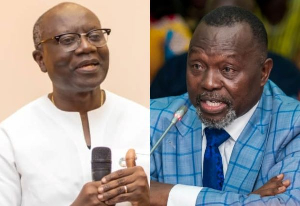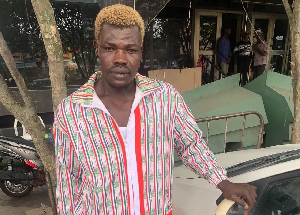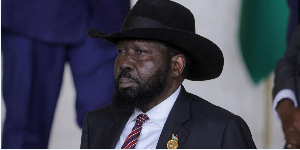By Kofi Akosah-Sarpong
Apart from national struggles for comfortable life such as good drinking water, proper sanitation practices, adequate food, shelter, sound healthcare, peace, among others, Ghanaians are increasingly coming to the conclusion that certain cultural practices pose challenges to their progress and need to be refined.
In the past years there have been Ghana-wide campaigns to attempt to refine some of these hampering cultural practices such as female genital mutilation, juju, ritual murders, witchcraft, early marriage, Pull Him/Her/Them Down syndrome, etc.
The Ghanaian Parliament has been involved in refining some of these destructive cultural practices through legislations informed by human rights values. But the new parliament, elected on December 7, is evenly divided. The new ruling National Democratic Congress (NDC) has 114 Members of Parliament (MPs), the main opposition New Patriotic Party (NPP) has 107 MPs and others 7 MPs.
This “hung parliament” will need superb democratic dance, as part of Ghana’s democratic growth, by the majority NDC to drive through its bills in the face of the much more democratic savvy NPP minority that sees the NDC democratic antecedents as suspect. (The NDC owner ex-president Jerry Rawlings has told the New York Times that his military junta PNDC was forced by the US State Department to democratize. The British diplomat, Craig Murray, who served in Ghana from 1998 to 2002, indirectly says the 1992 and 1996 general elections were rigged by Rawlings and his associates).
The picture that emerges is on-again, off-again showdown in the new legislature, making the NDC sense that winning the 2008 elections may not be as easy as rolling their policies through the even legislature. But such democratic atmosphere will be one of the fodders for Ghana’s democratic enlargement and will test how the new legislators will appropriate Ghanaian traditional and democratic values of consensus and participation in resolving contentious legislative issues without undermining national development.
Instead of rationally using democratic and traditional consensus mechanisms to resolve any gridlock that may crop-up in future legislative works, the Accra-based Daily Guide, part of the mass media in the forefront of cultural enlightenment, reports that some NDC MPs have resorted to the old dreaded juju spiritual rituals to resolve any anticipated deadlock that might crop up in parliamentary businesses. The target is the NPP Minority leader Osei Kyei Mensah-Bonsu in particular and the entire NPP parliamentary caucus. Writes Daily Guide, “A piece of the parliamentary juju has been reportedly fixed beneath the chair of the Minority Leader and Member of Parliament for Suame, Hon. Osei Kyei Mensah-Bonsu, apparently to subdue and charm him into a moron. This is happening at a time when Parliament is almost evenly divided between the Majority and Minority caucuses and every effort is being made to subdue political opponents in the Legislature.
“A parliamentary staff disclosed to Daily Guide that a group of ‘mallams’ and people believed to be occult grand-masters were seen spraying a sweet-scented substance and murmuring some strange-sounding incantations in the main Chamber of the House during the late hours of Tuesday January 6, 2009. Indeed, on the next day when Hon Kyei Mensah-Bonsu took his seat in the Chamber, he felt uneasy in the chair and immediately drew the attention of the House to the fact that he suspected there was something amiss about the seat.” While this may look scary, morally reprehensible and bordering on criminality, with its traditional spiritual consequences, the implications are far-reaching, bordering on the health of rationality and civility of the parliamentarians involved, and the signal it sends to Ghanaians and other Africans. It also undermines the on-going Ghana-wide campaigns to refine certain destructive cultural values, of which juju is one of them, in the development process. Surprised? Not necessarily! Almost two months ago, Gershon Kofi Bediako Gbediame, the NDC MP for Nkwanta South was reported by the Daily Guide to be involved in high-frequency juju dabbling that went bad (as they always do) and during “a meeting with some party executives (in the run up to the December 7 general elections) when suddenly he began screaming and was about to run but was restrained by those around him.” Gbediame had strange nightmares and some sort of mental illness and no peace-of-mind. And, if some MPs are juju-minded, how can they handle complicated developmental issues that demand higher reasoning and wisdom as Ghana increasingly veers to re-position itself as the “Black Star of Africa” that has enlightenment implications for the rest Africa. The insight into “parliament hit by juju” is that some MPs have still not explicated themselves from such frightful cultural practices despite almost all the MPs being university graduates, some with extensive global exposure.
As the number one centre for reasoning, consensus building and participation, the Ghanaian parliament is expected to radiate enlightenment against the backdrop of developmental challenges but the juju incident reveals it is still stuck in the dark side of the Ghanaian culture. The MPs involved in the juju incident brains, moulded by their culture, as Richard Nisbett indicates in The Geography of Thought and Norman Doidge’s The Brain That Changes Itself, refuse to let the rational part of their brains to resolve the challenges that may occur in the businesses of the hung parliament.
Still, on the juju MPs’ brains, while the scientific side of their minds demand objective evidence as to why they should plant juju and other charms on the chair of the Minority leader and the parliamentary chamber, their brains’ mythopoeic, irrational juju-thinking side entice them to irrational marvels – to the believe that a juju “fixed beneath the chair of the Minority Leader” will “apparently to subdue and charm him to be “a moron,” or stupid or a manipulable figure, so that the NDC, which has to navigate through a tough parliament, can easily influence the Minority leader and the NPP parliamentary group in order to pass legislative bills no matter how unrealistic they may seem.
The Ghanaian parliament is the key reflector of the country’s elites and the juju incident reflect the elites’ minds – a peculiar psychic disturbance where deadly negative superstition roams supreme against rational choices that calls for consensus building. A people whose elites’ mind is overly dominated by irrational parts of their culture and brain cannot think well and will find it difficult to draw from their traditional wisdom and the global prosperity ideals for progress.
Juju places limits on reasoning, thinking, reflection, contemplation and rationalization, for it makes the dabbler perpetually in a nervous state of anxiety – one cannot think well in such a state. Juju is dark; it weakens analysis and makes it very difficult to rationalize dire developmental issues. Juju jams the mind, beclouding it. Juju opens the emotional parts of the brain more than the rational parts, making the dabbler juvenile to the point of self-destruction – the MPs involved in the juju incident aim to decimate the Ghanaian parliament by stupefying the NPP caucus.
Still, juju can make one person destroy another without considering the consequences – Samuel Doe’s Liberian politicians should inform Ghanaian MPs. In a way, juju can make one overly wicked and inhuman. Despite being spiritual, because it is a negative spirituality, juju makes the dabbler spiritually weak – but the dabbler may feel, falsely, that he/she is spiritually strong a la Samuel Doe. Juju makes emotions outweigh principles and facts. Juju feeds the ego, makes the dabbler very egocentric, and either weakens or destroys the human element of humility and love – once again, Samuel Doe will teach Ghanaian MPs one or two lessons of the vastly deadly aftermaths of juju in politics. No doubt, juju is highly sort after by Ghanaian “Big Men” and “Big Women” in their ego trips as is the case with the MPs involved in the “juju hit parliament” episode. And if in 2009 a country’s parliament, a forum for healthy debates, is heavily involved in irrational juju practices, in a world of growing reasoning, high-powered researches, rationalization, and the remarkable intellectual feat of Barack Obama, then the country has deep-seated problems in its progress, for it can’t confront developmental challenges critically that will need high-level thinking, with “no bias, no bulls,” as CNN’s Campbell Brown would say.
This also raises the issue of trust, which cut across NDC or NDC or any political partisanship, in parliamentary consensus building that will need higher political dexterity and not any destructive juju charms intended to irrationally influence legislative works. Juju makes the MPs suspicious of each other and undermines trust, a key element in progress, of which the MPs are supposed to be directors. But the directors are mentally stifled if juju entangles it.
In Trust: The Social Virtues and the Creation of Prosperity, Francis Fukuyama explains that progress at any human level is driven by trust - a social capital that glues and bonds people and societies together to act voluntarily. Fear of juju undo the voluntary traditional bonding expected of the MPs in their legislative works. That MPs would go to parliamentary chambers looking over their shoulders and chairs for fear of some destructive juju-marabout schemes cast on them and not able to think well enough about legislative works is primitive, unGhanaian and counter-productive.
“Juju in parliament” undermines the majestic, deliberative and the broader mechanisms of democracy and freedoms that Ghana, against all odds for the past 17 years, have been painstakingly growing and enthusiastically positioning itself to export to the rest of Africa.
Opinions of Monday, 26 January 2009
Columnist: Akosah-Sarpong, Kofi
Irrationalizing the Ghanaian Parliament
Opinions













